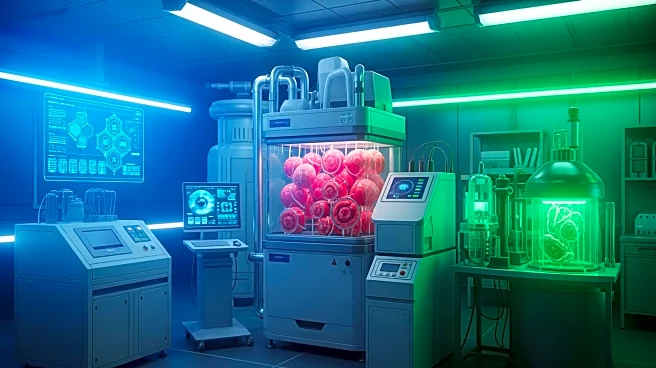What's Happening?
Lab-grown meat, also known as cultured meat, is produced using stem cells derived from animals, cultivated in controlled laboratory environments. The process involves nurturing these cells in petri dishes
with amino acids and carbohydrates to form muscle fibers resembling ground beef. This innovative approach aims to offer a sustainable solution to traditional meat production, reducing energy consumption, greenhouse gas emissions, water usage, and land requirements. Lab-grown meat production utilizes sophisticated technologies such as bioprocess design, tissue engineering, and 3D cell culture platforms.
Why It's Important?
Lab-grown meat presents a promising alternative to conventional meat production, addressing environmental concerns and animal welfare issues. By reducing the need for raising and slaughtering animals, it offers a more ethical approach to meat consumption. The technology also has the potential to significantly lower the environmental impact of meat production, contributing to efforts to combat climate change. As the industry advances, it could reshape the food landscape, offering consumers sustainable and cruelty-free options while challenging traditional meat producers to adapt.
What's Next?
The future of lab-grown meat depends on overcoming production challenges and gaining consumer acceptance. As companies refine their technologies and scale production, lab-grown meat may become more accessible and affordable. Regulatory approval and public perception will play crucial roles in its commercialization. As the industry progresses, it could influence broader shifts in food consumption and production, encouraging more sustainable practices and reshaping societal attitudes towards meat.
Beyond the Headlines
Lab-grown meat raises ethical questions about the use of animal cells and the potential impact on traditional farming communities. The industry must navigate these concerns while promoting the benefits of reduced animal suffering and environmental impact. Additionally, the technology's reliance on laboratory settings and specialized equipment poses challenges for scalability and cost reduction. As the industry evolves, it may influence broader cultural shifts in food consumption and production, encouraging more sustainable practices and reshaping societal attitudes towards meat.









